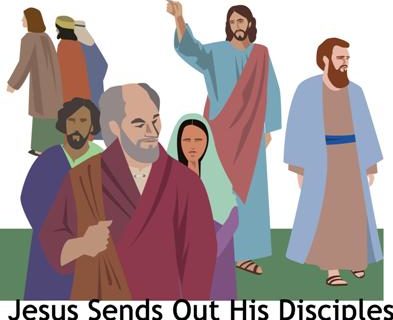From the pulpit the congregation repeatedly hears the beckoning call to seek someone during the week to share the Gospel with, to be an encourager to the downtrodden, and to invite someone to the church services. This is most often followed up with an explanation from the Scriptures that it is every child of God’s responsibility to share the Gospel message with all we have opportunity.
Mark 16:15 states,
“And he said unto them, Go ye into all the world, and preach the gospel to every creature.”
This exhortation is then reinforced to the local New Testament assembly with the following Scriptures.
Matthew 28:19-20,
“Go ye therefore, and teach all nations, baptizing them in the name of the Father, and of the Son, and of the Holy Ghost: Teaching them to observe all things whatsoever I have commanded you: and, lo, I am with you alway, even unto the end of the world. Amen.”
Acts 1:8,
“But ye shall receive power, after that the Holy Ghost is come upon you: and ye shall be witnesses unto me both in Jerusalem, and in all Judaea, and in Samaria, and unto the uttermost part of the earth.”
At the very core of the exhortation we find the reason for the urgent call in the following verses:
Matthew 9:37-38,
“Then saith he unto his disciples, The harvest truly is plenteous, but the labourers are few; Pray ye therefore the Lord of the harvest, that he will send forth labourers into his harvest.”
Luke 10:2,
“Therefore said he unto them, The harvest truly is great, but the labourers are few: pray ye therefore the Lord of the harvest, that he would send forth labourers into his harvest.”
But let it be understood here that the Lord gave a declarative statement, “The harvest truly is plenteous”; that is, the “harvest” being the “souls” who are ready to receive the Gospel message are plenteous. What is needed: the “labourers” to go into the Lord’s harvest.
Sadly, too often the exhortation and the supporting Scripture passages are being limited by the congregation to mean that we are to pray that the Lord would call more men to the Gospel ministry so that churches could send them to new fields of labor. Note that this is a needed prayer. However, the problem with this limited mindset is that we fail to realize that the Lord was speaking to His church – in that He was stating that our prayer should be that we would open our hearts in prayer to being sent as one of the Lord’s labourers in His harvest of souls in our own community.
In 2 Corinthians 5:18-20 we read that the apostle Paul wrote to the church in Corinth,
“And all things are of God, who hath reconciled us to himself by Jesus Christ, and hath given to us the ministry of reconciliation; To wit, that God was in Christ, reconciling the world unto himself, not imputing their trespasses unto them; and hath committed unto us the word of reconciliation. Now then we are ambassadors for Christ, as though God did beseech you by us: we pray you in Christ’s stead, be ye reconciled to God.”
In Acts 26:18 we also read of the purpose for going into the Lord’s harvest of souls,
“To open their eyes, and to turn them from darkness to light, and from the power of Satan unto God, that they may receive forgiveness of sins, and inheritance among them which are sanctified by faith that is in me.”
In Isaiah chapter 6 we read that the prophet Isaiah had a vision, whereas the Lord allowed him to see the sin and iniquity that abounded in the nation of Israel. As a result, Isaiah dropped to his knees and asked the Lord to forgive him of his sins, and he acknowledged that he lived amongst a people of unclean lips. One of the seraphims then flew to Isaiah and placed a live coal from the altar upon his mouth – signifying that his iniquity and sin had been forgiven. Then the Lord himself asked the following question,
Isaiah 6:8,
“Also I heard the voice of the Lord, saying, Whom shall I send, and who will go for us? Then said I, Here am I; send me.”
When this is truly our prayer and response, the Lord will have provided more labourers. The question before us, “Are we willing to pray and to respond as Isaiah did before the Lord?”



